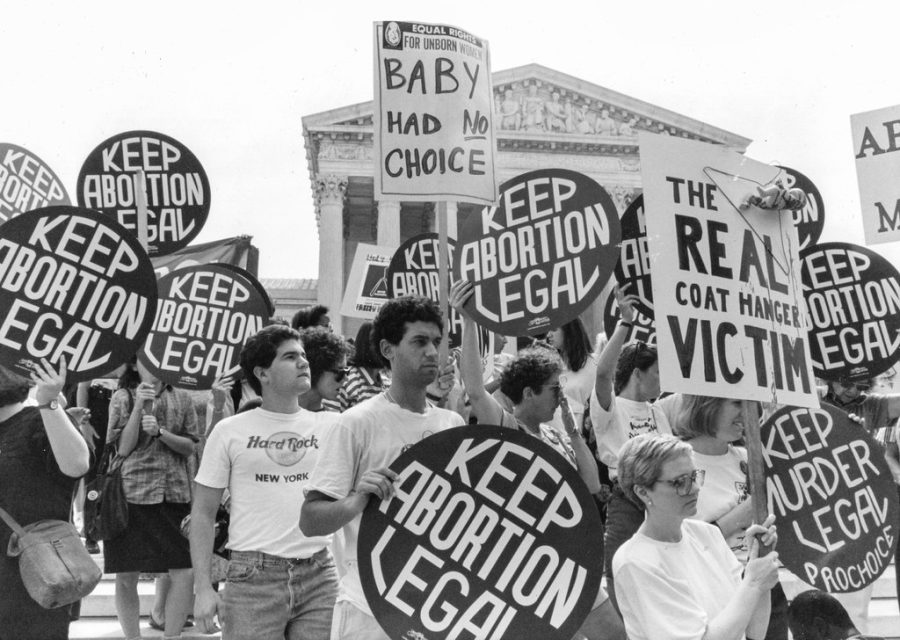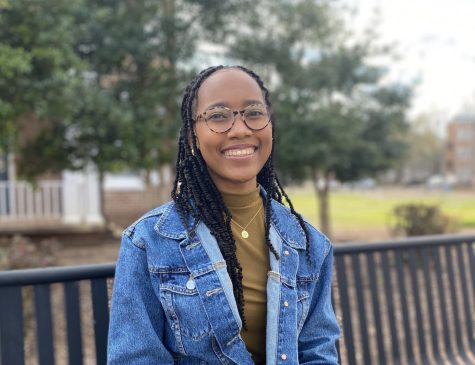Echols: Overturning of Roe v. Wade continues the cycles of poverty for marginalized communities
Lorie Shaull is licensed under CC BY-SA 2.0
Pro-choice and anti-abortion demonstrators outside the Supreme Court in 1989, Washington DC.
June 27, 2022
According to the 14th Amendment, “No State shall make or enforce any law which shall abridge the privileges or immunities of citizens of the United States; nor shall any State deprive any person of life, liberty, or property, without due process of law; nor deny to any person within its jurisdiction the equal protection of the laws.” As of June 24, when Mississippi Attorney General Lynn Fitch released her statement regarding the United States Supreme Court’s decision to overturn Roe v. Wade through Dobbs v. Jackson Women’s Health Organization, the constitutional right to safe abortions is no longer included in that sentiment.
Now that the SCOTUS overturned Roe v. Wade, the 2007 Mississippi trigger law that permits abortions only when the mother’s life is at risk or when the pregnancy resulted from a rape reported to law enforcement is set to go into effect. This will strip about 1.5 million women across the state of their right to an abortion. It is an attack on reproductive rights.
But this decision also will adversely affect impoverished populations and communities of color. Wealthy women, not bound by the restrictive effects of poverty, systemic racism and discrimination, have the means to travel to states protecting women’s rights and receive abortions. At the same time, those less fortunate will take matters into their own hands — likely resulting in accidental deaths from at-home abortions — or they continue with birth and remain in poverty.
Mississippi is home to the highest poverty rate in the nation. Leading in this statistic are women and those found in communities of color. Poverty can be attributed to a lack of education — especially sexual education— lack of good health care and systemic barriers. Low-income Mississippi women with limited access to health care, a lack of choices for effective birth control and noncomprehensive or nonexistent sex education will be among the worst hit by the SCOTUS decision.
Furthermore, banning abortions in Mississippi, with the highest concentration of African Americans, will increase the mortality rate during pregnancy and childbirth for Black women due to lack of access and health care professionals not taking Black women seriously. Mississippi’s leaders have not taken significant strides in addressing the issues of mortality rates during pregnancies among impoverished women — especially African American women to justify even considering restricting abortion access.
Studies have also shown that forcing women into unwanted pregnancies through denied abortions creates economic hardships which last years after they have their child. These women become even further locked into the cycles of poverty and lack of education with little to no escape. Along with forcing women into unwanted pregnancy, overturning Roe v. Wade will potentially force people into undesirable jobs to pay for the costs of pregnancy and raising children; to defer or give up on their dreams of education entirely and to accept poor working conditions because they have no other option — they now have children to pay for.
Regardless of if Gov. Tate Reeves wants to admit it, this decision will not bring about “more strollers pushed, more report cards given, more little league games played and more lives well lived.” It will likely bring about the opposite.
Along with struggling parents, more children will be subjected to trauma and abuse in Mississippi’s troubled foster care system and a lack of resources while living in poverty. These consequences, along with a lack of supervision from parents constantly working to support their unwanted kids, will likely contribute to a rise in crime. Society, in all probability, will then blame the increase in crime on the child’s “upbringing” and “unfit parents” without recognizing they are denying Mississippians the right to terminate a pregnancy if they feel they are unfit parents or aren’t in the position to care for their unborn child.
It seems the overturning of Roe v. Wade could be an unintentional trap for disenfranchised communities to continue to serve as the scapegoat for some of our state’s hidden problems.
Maybe SCOTUS and the Mississippi Legislature genuinely care about the unborn and made this decision to protect the voices that can’t speak for themselves; however, either they don’t understand the serious and detrimental ramifications of this decision on the already born, or they don’t care. Either rationale is unacceptable, and as usual, impoverished and marginalized communities will get the short end of the stick in the end.









